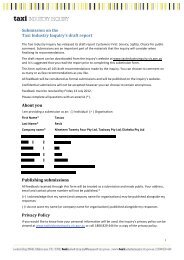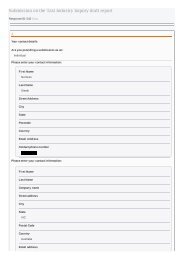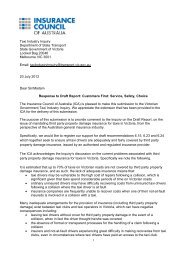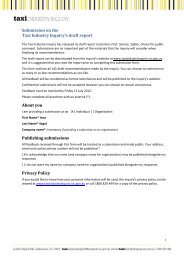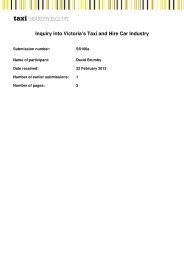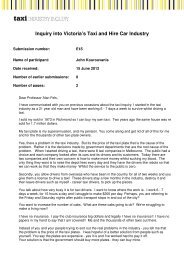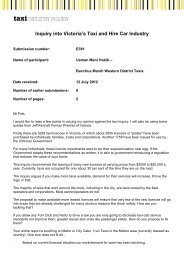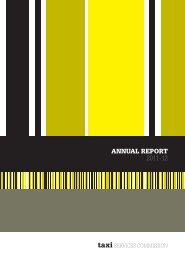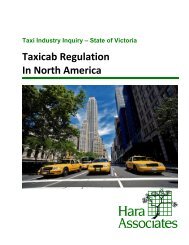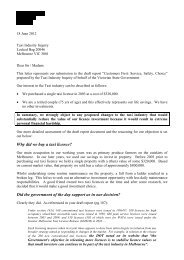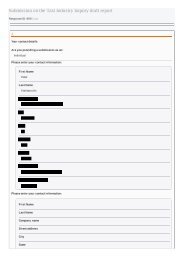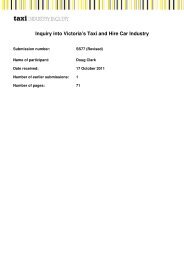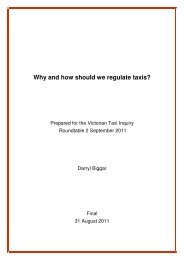Part D â Understanding and improving industry performance (PDF ...
Part D â Understanding and improving industry performance (PDF ...
Part D â Understanding and improving industry performance (PDF ...
You also want an ePaper? Increase the reach of your titles
YUMPU automatically turns print PDFs into web optimized ePapers that Google loves.
Case study<br />
Authorisations granted by the ACCC to taxi networks to require use of the Cabcharge<br />
payment system<br />
On 25 February 1986, the Trade Practices Commission (predecessor to the ACCC) granted authorisation to De<br />
Luxe Red & Yellow Cabs in Sydney to provide radio booking services on the condition that taxi operators <strong>and</strong><br />
drivers accept the taxi hiring account system (Cabcharge) <strong>and</strong> display the decals of that system.<br />
At the time, the Cabcharge Account System covered the acceptance of most major credit cards <strong>and</strong> vouchers.<br />
The Commission agreed that consumers should not be misled as to the availability of credit card services <strong>and</strong><br />
that it was in the public’s interest for De Luxe to require that all taxis offer the Cabcharge payment system to<br />
passengers. Between 1986 <strong>and</strong> 1994, 11 other taxi companies/cooperatives in New South Wales, Victoria <strong>and</strong><br />
South Australia (many linked to Cabcharge) were granted authorisation for similar conduct to De Luxe.<br />
Most, if not all, of the networks who had authorisation put in place incentive schemes to encourage operators to<br />
process card transactions through Cabcharge in preference to other providers.<br />
In 2004, the ACCC commenced the process for revocation of the authorisations on the basis that there may no<br />
longer be any public benefit in continuing them because credit card payment had become such a universally<br />
accepted form of payment <strong>and</strong> it was in the taxi drivers’ interest to process most cards. However, the ACCC<br />
decided that the small public benefit generated by the authorised conduct marginally outweighed the negligible<br />
public detriments <strong>and</strong> chose not to revoke the authorisations.<br />
Mr Michael Jools, President of the New South Wales Taxi Drivers Association, was dissatisfied with this decision<br />
<strong>and</strong> applied to the Australian Competition Tribunal under s101(1) of the Trade Practices Act 1974 for a review of<br />
the decision. The Tribunal considered further whether the authorisations would continue to make new entry <strong>and</strong><br />
competition less likely than would otherwise be the case. They considered that with the authorisations in place,<br />
the opportunities for a new market participant would be severely reduced. However, without the authorisations,<br />
there would be very little incentive for Cabcharge to permit its credit cards to be used in other systems. Further,<br />
Cabcharge did not need the authorisations in force to encourage taxi networks to take up their system.<br />
The Tribunal found that the potential benefit in sustaining the authorisations could not be said to amount to a<br />
sufficiently certain benefit <strong>and</strong> the authorisations were revoked in June 2006.<br />
The interconnectivity between the NSPs <strong>and</strong> Cabcharge<br />
means that potential entrants have to negotiate<br />
individually with taxi operators or drivers for the supply of<br />
competing non-cash payment systems. Negotiation with<br />
many thous<strong>and</strong>s of individual taxi operators <strong>and</strong> drivers<br />
is highly inefficient <strong>and</strong> takes time. The inquiry has also<br />
been told that operators who are affiliated to NSPs with<br />
links to Cabcharge are hesitant to install Cabcharge’s<br />
competitors’ payment systems as they fear being<br />
penalised either directly through the booking network or<br />
indirectly by losing assigned licences that are effectively<br />
under Cabcharge’s control.<br />
12.4.3. Market <strong>performance</strong><br />
The surcharge <strong>and</strong> the behaviour of payment<br />
processing providers<br />
The market characteristics described above have led to the<br />
10 per cent surcharge on electronic payments becoming<br />
st<strong>and</strong>ard practice for all payment systems providers.<br />
It is important to underst<strong>and</strong> the reasons why this charge<br />
remains so high – that is, so far above the merchant<br />
service fees that are levied on payments processors.<br />
The inquiry underst<strong>and</strong>s that a significant factor in<br />
maintaining the surcharge is that portions of the surcharge<br />
are directed to NSPs – <strong>and</strong>, in some instances, to<br />
operators <strong>and</strong> drivers – as incentive payments for the use<br />
of particular payment processing systems.<br />
The Gange Corporation told the inquiry that under Silver<br />
Top Taxis’ commercial arrangement with Cabcharge,<br />
Silver Top Taxis are entitled to a service fee of 2.5 per cent<br />
on all transactions it processes on behalf of the relevant<br />
operator. Beyond a certain threshold, a further two per<br />
cent rebate on Cabcharge transactions is also provided<br />
by Cabcharge to Silver Top Taxis, which is passed through<br />
to the taxi operator <strong>and</strong> not retained by Silver Top Taxis.<br />
So, in total, up to 4.5 per cent is offered by Cabcharge as<br />
incentive payments. 20<br />
20 Gange Corporation, Op. Cit., p. 7<br />
258



